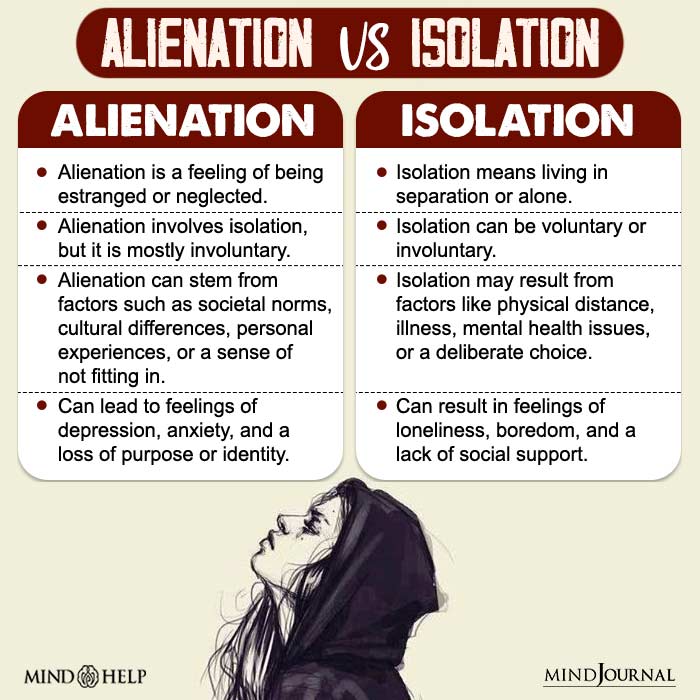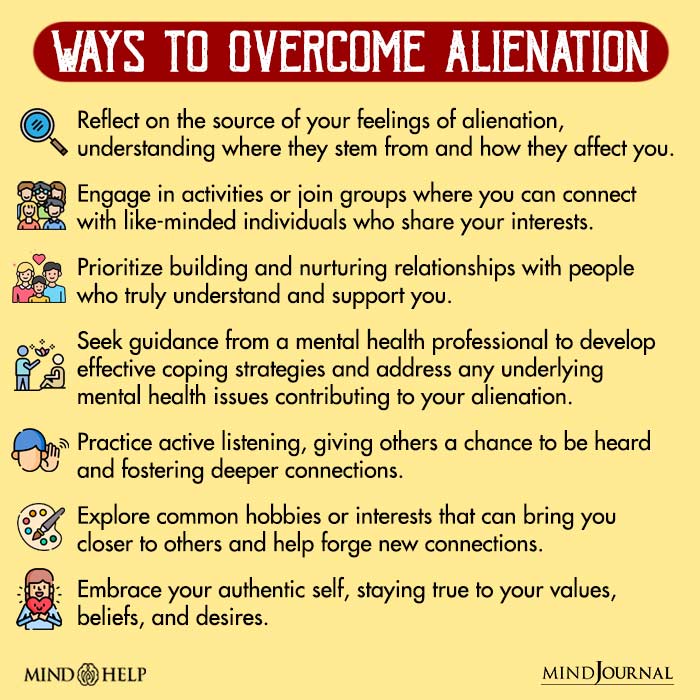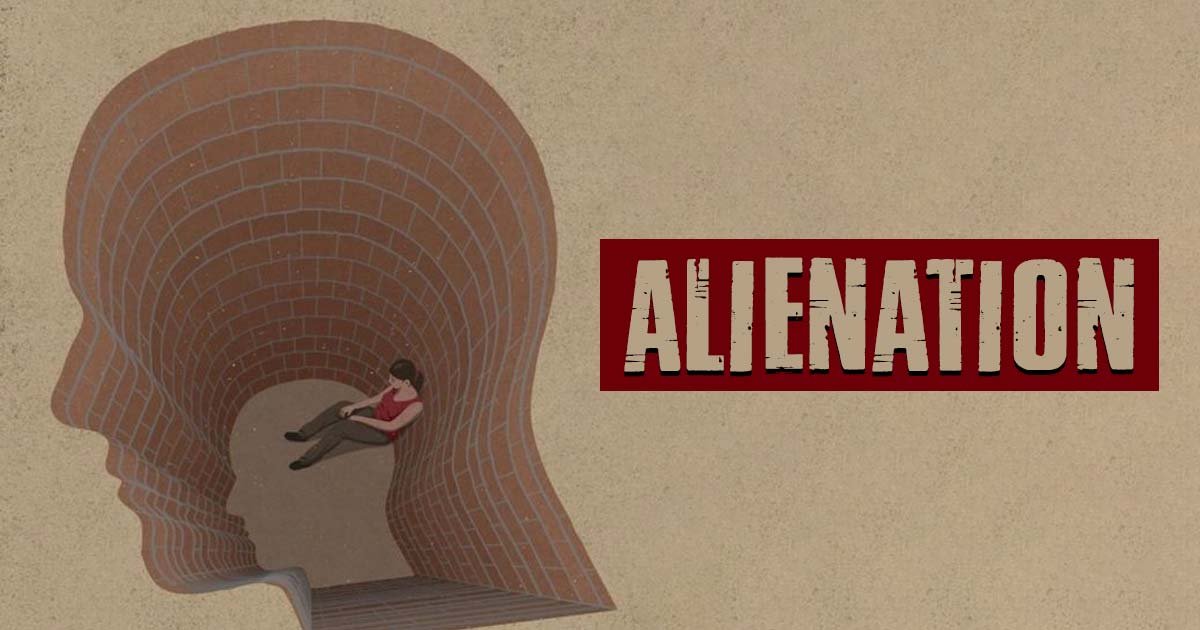Table of Contents
Have you ever felt cut off from yourself, others, or the world around you? That feeling is known as alienation, a sense of disconnection or isolation that can deeply affect your mental health. Let’s learn how it contributes to feelings of depression, anxiety, and overall psychological distress.
What is Alienation?
Alienation is when a person 1 Kalekin-Fishman, D., & Langman, L. (2013). Alienation. Sociopedia. https://doi.org/10.1177/2056846013111 starts to feel disconnected or cut off from their surroundings and the people around them. It’s like they withdraw or isolate themselves from others, including loved ones and society. They might feel distant and separated, even from their own emotions. The idea of alienation comes from theories by Karl Marx 2 Yagi K. (2021). Marx’s theory of capital in the history of economics: Marx’s concept of capital, classical school, Austrian School, and growth theory. Evolutionary and Institutional Economics Review, 18(2), 465–489. https://doi.org/10.1007/s40844-020-00196-9 and other philosophers.
It’s worth mentioning that research has found that mothers are more likely 3 Van Holland De Graaf, J., Hoogenboom, M., De Roos, S., & Bucx, F. (2018). Socio-demographic Correlates of Fathers’ and Mothers’ Parenting Behaviors. Journal of child and family studies, 27(7), 2315–2327. https://doi.org/10.1007/s10826-018-1059-7 than fathers to be involved in situations where they intentionally keep children away from the other parent. Experiencing alienation can make a person 4 Zuk, P., McGuire, A. L., & Lázaro-Muñoz, G. (2018). Alienation, Quality of Life, and DBS for Depression. AJOB neuroscience, 9(4), 223–225. https://doi.org/10.1080/21507740.2018.1561543 feel hopeless, have low self-esteem, and lack motivation. It also makes it harder for them to form healthy relationships and find support, which can make them feel even more alone and distressed.
Read More About Self-Esteem Here
What are the Symptoms of Alienation?
Some common signs 5 Rayce, S. L. B., Holstein, B. E., & Kreiner, S. (2008). Aspects of alienation and symptom load among adolescents. The European Journal of Public Health, 19(1), 79–84. https://doi.org/10.1093/eurpub/ckn105 of alienation include:
- Feeling distant from your work, family, and friends
- Feeling helpless
- Experiencing a pervasive feeling that the world lacks purpose
- Feeling left out or disconnected from conversations, events, or social circles
- Struggling to approach and communicate with others, particularly authority figures
- Experiencing a heightened sense of unease, discomfort, or fear when interacting with others
- Displaying a tendency to reject or disobey rules and societal norms

Different Types of Alienation
There are different types 6 (PDF) Alienation: A Theoretical Overview. (n.d.). ResearchGate. Available from: https://www.researchgate.net/publication/271522454_Alienation_A_Theoretical_Overview of alienation that can affect people in various ways:
- Cultural estrangement, when you feel detached from established values and norms in your culture or community.
- Meaninglessness, when you struggle to find meaning or purpose in your actions, relationships, or the world around you.
- Normlessness is the feeling of being disconnected from social conventions or engaging in behavior that goes against societal norms.
- Powerlessness, which involves believing that your actions have no impact on outcomes or feeling like you have no control over your own life.
- Self-Estrangement is feeling disconnected from your own identity, thoughts, emotions, or values.
What Causes Alienation
Alienation can stem from 7 Lagios, C., Lagios, N., Stinglhamber, F., & Caesens, G. (2022). Predictors and Consequences of Work Alienation in Times of Crisis: Evidence from Two Longitudinal Studies During the COVID-19 Pandemic. Current psychology (New Brunswick, N.J.), 1–15. Advance online publication. https://doi.org/10.1007/s12144-022-03372-9 different causes, including:
1. Health-related Causes
Certain health conditions, such as mental health disorders like symptoms of depression, anxiety, dissociative disorders or personality disorders can impact how you perceive yourself, others, and the world around you.
Read More About Depression Here
2. Social Causes
Factors like being settled away from hometown, facing discrimination, or having difficulty fitting in socially can contribute to this sense of disconnection.
Read More About Discrimination Here
3. Job-related Causes
Work-related factors, for instance, experiencing oppressive working conditions, feeling undervalued, or lacking a sense of fulfillment in your job can lead to a disconnection from work and the larger society.
4. Causes During Adolescence
Adolescents may experience alienation due to various factors, such as struggling with identity formation, feeling misunderstood or not accepted by peers, or facing conflicts between their own values and societal expectations.
5. Parental Causes
Parental issues such as neglect, abuse, overly strict parenting, or a lack of emotional support can lead to a sense of detachment from parents and a feeling of not being understood or valued.
Alienation and Mental Health
Alienation can have significant impacts 8 Chen, W. C., Chen, S. J., & Zhong, B. L. (2022). Sense of Alienation and Its Associations With Depressive Symptoms and Poor Sleep Quality in Older Adults Who Experienced the Lockdown in Wuhan, China, During the COVID-19 Pandemic. Journal of geriatric psychiatry and neurology, 35(2), 215–222. https://doi.org/10.1177/08919887221078564 on mental health, such as:
- It can lead to feeling hopeless and sad, which may raise the risk of depression.
- Alienation often causes overthinking and rumination, which can fuel anxiety.
- It creates a deep sense of loneliness and isolation, making people feel like they lack support.
- It can lower self-esteem and lead to a negative self-image, leaving a person feeling unworthy or inadequate.
- Alienation can make it hard to build and maintain close relationships, leading to struggles with social connection.
Read More About Rumination Disorder Here
On the other hand, several mental health disorders 9 Mircea Stefan Simoiu, Liu, L., Ji, Y., Luwen Huangfu, & Zeng, D. (2023). Identifying emotional causes of mental disorders from social media for effective intervention. 60(4), 103407–103407. https://doi.org/10.1016/j.ipm.2023.103407 can contribute to or cause feelings of alienation, such as:
- Depression can lead to a profound sense of disconnection and isolation from others.
- Social anxiety disorder can lead individuals to avoid social interactions, resulting in feelings of alienation.
- Individuals with Borderline personality disorder (BPD) may experience fear of abandonment and emotional instability, which can contribute to alienation.
- Schizophrenia can lead to false belief and hallucinations which affects social interaction and resulting in alienation.
- Individuals with Autism spectrum disorder (ASD) may struggle with forming connections and experiencing a sense of belonging, leading to alienation.
- Dissociative disorders in which episodes of detachment from reality and self can contribute to a feeling of alienation.
- Progressive cognitive decline and memory loss for dementia can create a sense of disorientation and disconnection, leading to alienation.
Read More About Borderline Personality Disorder (BPD) Here

How to Help Someone Dealing with Alienation
Some different ways 10 Templer, K., Matthewson, M., Haines, J., & Cox, G. (2016). Recommendations for best practice in response to parental alienation: findings from a systematic review. Journal of Family Therapy, 39(1), 103–122. https://doi.org/10.1111/1467-6427.12137 to help someone experiencing symptoms of alienation include:
- Encourage social connections to join social groups or clubs that align with their interests.dealing with alienation
- Be a good listener and offer a non-judgmental space for them to express their feelings.
- Encourage healthy habits like exercise, adequate sleep, and a balanced diet.
- Suggest seeking therapy or counseling to explore the underlying causes of alienation and develop coping strategies.
- Offer to accompany them to social activities or events if they feel more comfortable with support.
Takeaway
Alienation encapsulates the profound sense of detachment and estrangement from oneself, others, and society at large. It highlights the consequences of disconnection and the desperate longing for connection, ultimately urging us to seek meaningful relationships and strive for a sense of belonging in our shared existence.
At a Glance
- Alienation is when a person starts to feel disconnected or cut off from their surroundings and the people around them.
- Symptoms of alienation can include feelings of isolation, disconnection, loneliness, a lack of belonging, and a sense of not fitting in or being understood.
- Alienation and mental health issues can stem from health-related causes, parental causes, societal causes, etc.
- Alienation can have adverse effects on mental health, including increased risk of depression, anxiety, and feelings of loneliness.
- Helping someone dealing with alienation involves being empathetic, encouraging social connections, promoting self-care, and suggesting professional help.
Frequently Asked Questions (FAQs)
1. Can technology and social media contribute to alienation?
Extensive research has revealed that spending too much time on social media can actually make us feel more alienated and lonely.
2. Can alienation be temporary or long-lasting?
Alienation can be experienced as both a temporary state of disconnection and as a persistent, long-lasting condition depending on the underlying factors and individual circumstances.
3. Is alienation a mental illness?
Alienation is not considered a mental illness. It is a psychological and sociological concept that refers to a sense of disconnection or estrangement from oneself, others, or society.















